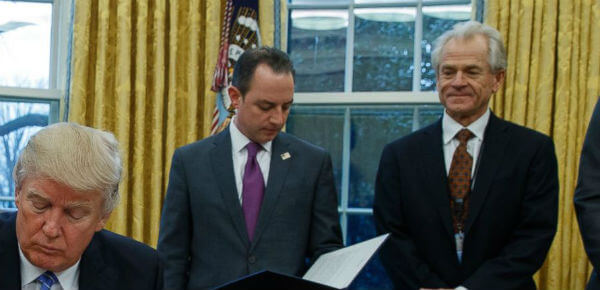
While considering the danger posed by the head of Trump’s National Trade Council, Jacob Heilbrunn writes: To counter the manifold economic and military threats the United States faces, Navarro recommends a sweeping revision of U.S. foreign policy. He wants high tariffs, the repudiation of trade pacts and, above all, a massive military buildup against China. One of Navarro’s aspirations is to beef up military ties with Taiwan, which Beijing considers part of China. Calling the Obama administration’s treatment of Taipei “egregious,” Navarro declared in Foreign Policy that it has been “repeatedly denied the type of comprehensive arms deal it needs to deter China’s covetous gaze.” At the same time, Navarro wants to end sequestration on defense and go on an all-out shipbuilding binge for the U.S. Navy. Nor does Navarro seem to see a bomber that he would not like to build.
The hysterical economic warnings, the scary prescriptions and the self-defeating proposals would simply be fanciful nonsense if Navarro weren’t whispering in the ear of the most powerful man in the world. The fact that he is makes them dangerous. Of course, where Trump will actually head still remains an open question. After his initial questioning of a “one China” policy, Trump, in a phone call with Chinese President Xi Jinping on Thursday, seems to have endorsed it. But at the same time, Trump is clearly seeking to use Japan to balance Chinese power, which is why he is hosting Japanese Prime Minister Shinzo Abe this weekend. On Friday, Abe even promised to invest in America and joked that he would help build a Maglev train that would convey the president within an hour from Washington to his Manhattan aerie.
Like not a few presidential advisers in history, Navarro may not be able to enact everything he proposes. Perhaps he will breathe fire about the perfidy of China and other countries but not decisively influence economic policy. In this scenario, Navarro would serve as a convenient release valve for ventilating frustration about the further loss of manufacturing jobs that is likely to continue under Trump, thanks mostly to the inexorable rise of artificial intelligence and automation. In the Washington Post, Ed Hess, a professor of business administration at the University of Virginia, predicts that tens of millions of jobs will be destroyed in the next five to 15 years by emerging technologies, and 47 percent wiped out over the next 10 to 15 years.
Another possibility is that Navarro doesn’t get free rein but has to jockey for power with the other economic players in the administration, including Steven Mnuchin at Treasury, a former Goldman Sachs executive who has no history of China antagonism. In this scenario, Trump doesn’t jettison NAFTA but rather accedes to some cosmetic changes that don’t fundamentally alter the pact. At the same time, he retreats from his bogus charge that Beijing is depressing its currency — it isn’t — and initiates trade talks with the Chinese while also working with them to corral North Korean nuclear ambitions.
But there’s a third possibility — one that we shouldn’t dismiss. In this scenario, the Navarro line prevails. Trump unilaterally slaps draconian tariffs on Mexico and China. In turn, the World Trade Organization says they’re illegal. Trump, never one to defer to the courts, pulls the U.S. out of the WTO, and the international economic order is upended. With tariffs high and Trump bailing out of international institutions, it doesn’t take long before we end up in a global depression. The last time something like this occurred it led directly to the rise of fascist regimes in Germany, Italy and Japan, with nationalist leaders promising that domestic repression and external expansion were a quick and easy remedy to their nation’s woes. [Continue reading…]

